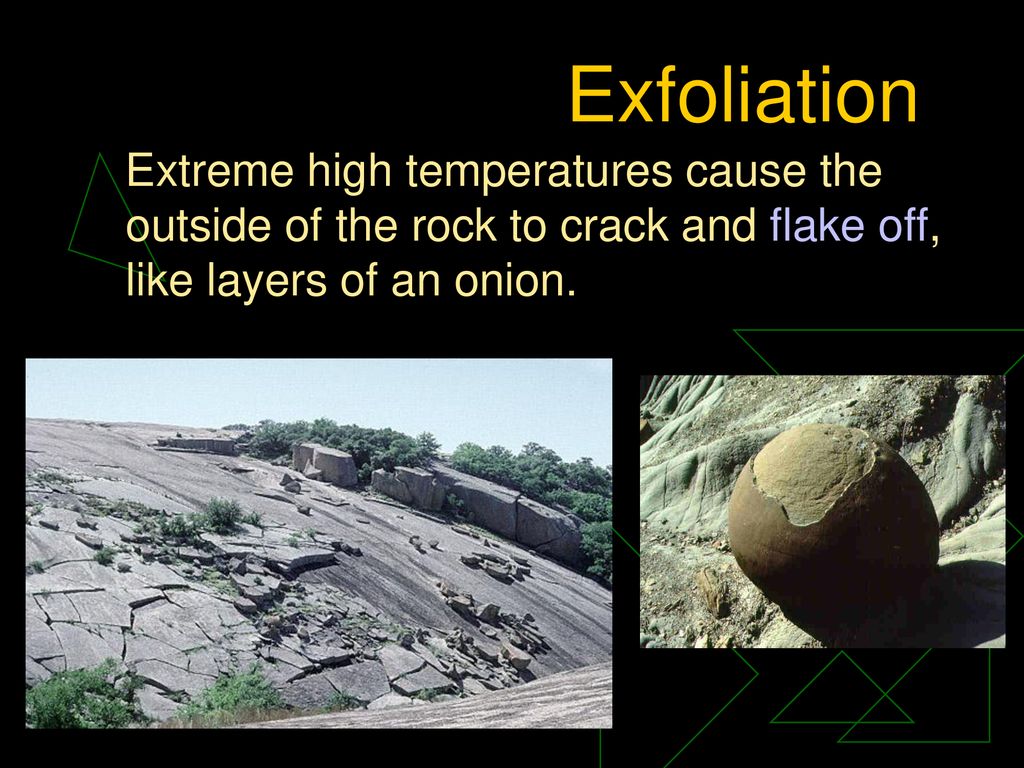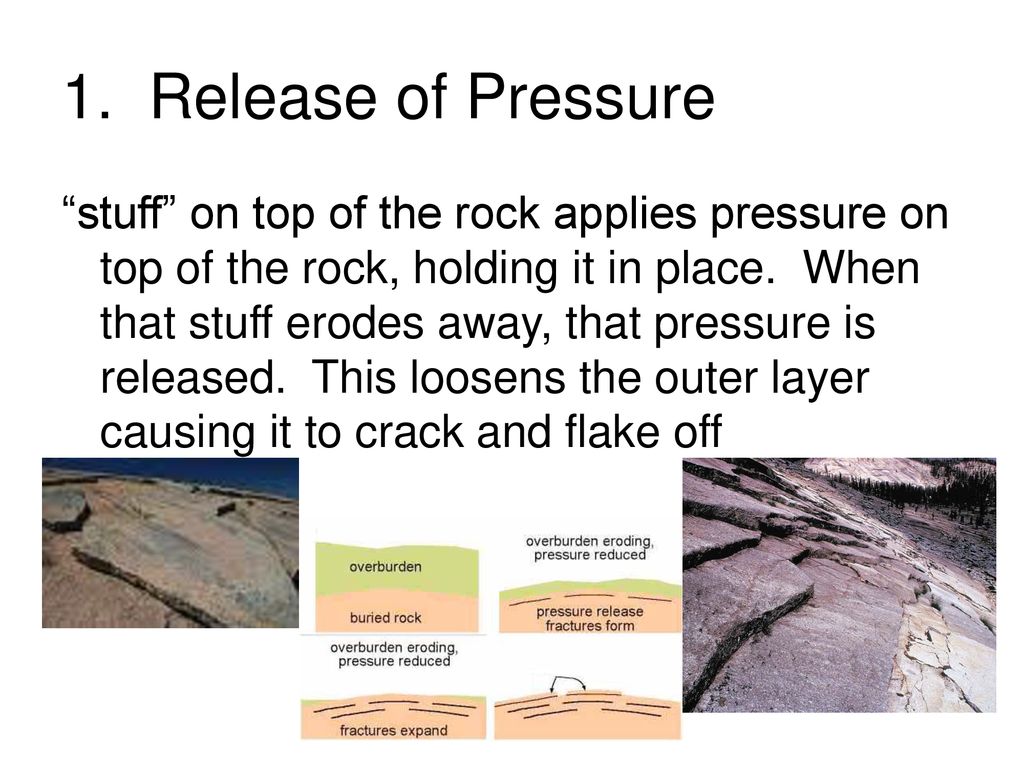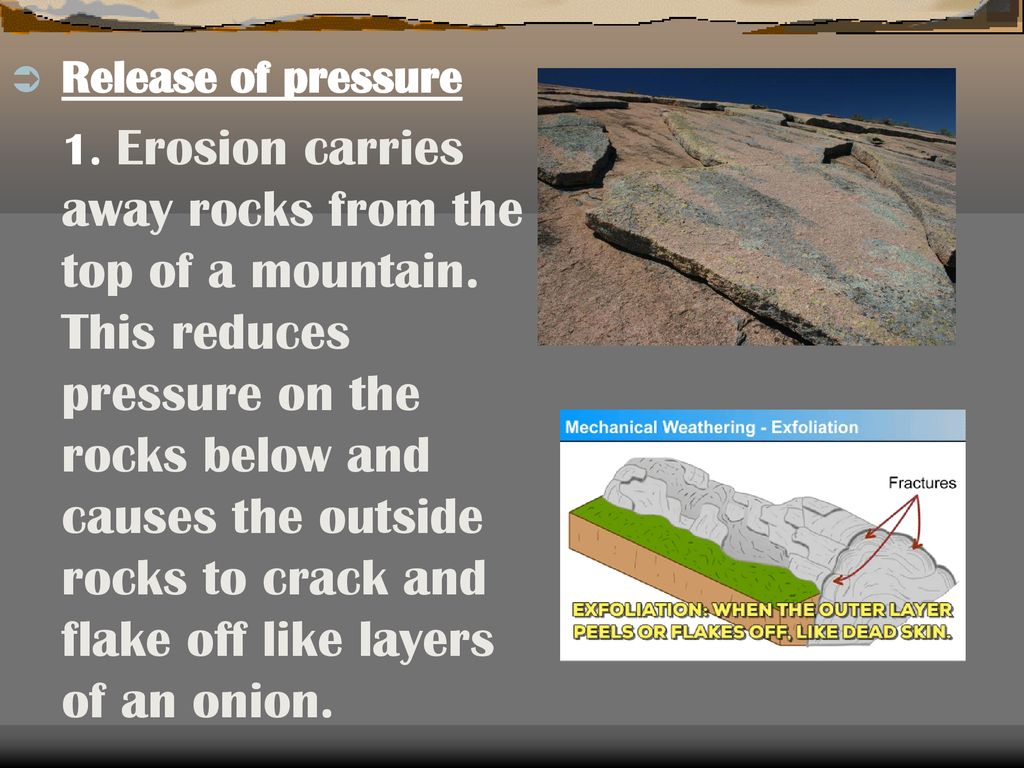Causes Rock to Flake Off in Layers
The BREAKING DOWN of rock into smaller pieces. Aside from normal wear and tear and moisture issues soft rock like sandstone tends to flake due to chemical exposure.

Weathering The Process Of Rock Breaking Down Into Smaller Pieces Ppt Download
This release of pressure causes the outside of the rock to crack and flake off like the layers of an onion.

. Thermal stress weathering causes the outer layers of rocks to appear to peel off exfoliation. A 90 fold in the eastern Grand Canyon is pictured here Photo courtesy Andrew A. In layered sedimentary rocks this is usually the case when some of the layers are less resistant against weathering eg.
What mechanical weathering causes rock to flake off in layers. Figure F4 shows a lead inclusion on the surface. The reason that the rocks on the bottom of the layers of rocks are the oldest is because rocks will continue to pile on top of each other.
All the layers through which Grand. Exfoliation Outer layer of rock flakes off by compression andor heating differences. Peeling off of outer layers of rocks happens through the process of exfoliation.
Flaking also called spalling in natural stone is generally an indicator of sub-florescence a condition in which mineral salts are carried into the stone by moisture and accumulate beneath the stones surface creating stress within the pores of the stone. Water entry into cracks or open holes in the brickwork can also cause this. Release of Pressure As the surface of a rock is eroded the rock begins to release pressure Causes top layers of the rock to crack and flake off 8.
As igneous rocks are uplifted the pressure of the surrounding rocks is reduced and the granite expands. Note that as the initial chemical reaction occurs it causes a change in the chemistry of the water and this results in a new set of reactions with different mineral being precipitated and it is this sequence of chemical reactions. If there is one layer of rock on the bottom and another layer piles on top of it the layer on the bottom is now the oldest and the layer on top is the youngest.
The layer on the top of the rock layer is the youngest layer of rocks. As erosion removes material from the surface of a mass of rock pressure on the rock is reduced. The MOVEMENT of sediment by wind water ice or gravity.
The whole sequence of sedimentary layers through which Grand Canyon cuts has been bent and folded without fracturing. Shown below are two examples of a plated deposit that lost adhesion due to a pretreatment system that failed to remove two common adhesion killers. This expansion causes stress within the brick which then causes some of the clay to flake off.
Larger holes allow more water in and out causing brick. One cause of Mechanical weathering that pulls loosened rocks down a mountain cliff in a landslide breaking up rocks. You can arrest and stop the flaking if you can stop water from entering the brick.
The same thing happens on larger levels here with the freezethaw cycling. This includes the Tapeats Sandstone located at the bottom of the sequence. This produces smooth rounded domes of rock.
Most people experience flagstone flaking around a pool since the chlorine and other chemicals are very hard on the stone. Heating and cooling at fast rates. This is a result of thermal stresses developed in the rocks and is an example of thermal weathering which is a.
Landslides can result from several causes including mechanical weathering the gradual disintegration of rock due to physical activity chemical weathering the gradual disintegration of rock due to chemical activity erosion the removal of rock or soil by wind water or other natural processes earthquakes and volcanic activity. This acid dissolves the calcium carbonate in limestone. - rainwater mixes with carbon dioxide in Earths atmosphere to form weak carbonic acid.
This expansion and contraction can cause the outer layer of rocks to flake off. This results in either the creation of a hard mineralized crust around the material or perhaps replacement of the material itself by precipitated minerals. This condition can be particularly damaging if the stone experiences freeze-thaw cycles since the.
If this happens and the temperature drops below freezing while the brick is saturated with water the water then expands as it freezes. Answer 1 of 2. Mechanical weathering- causes rock to flake off in layer.
Release of Pressure Exfoliation. Stresses within the rock cause the outer layers of the rock to flake off in thick curved sheets. Mechanical weathering- breaks rock by ice wedging Chemical weathering causes rust on some rock.
Water freezes in a crack in a rock it expands and makes the crack bigger. Freezing Thawing When water in the cracks of rocks freezes it expands causing the crack to enlarge or get bigger. Living Organisms Trees grow in cracksAnimals burrow mixing soil As the rock is heated it expands then contracts as temperatures drop.
What is the process in which layers of rock flake off a larger rock as a result of weathering. Type of rock permeability Climate temperature humidity Permeable. At the base of the mountain or cliff the broken fragments collect in huge piles of rock called talus.
Material has spaces that allow water to seep. Thermal stress weathering is a type of physical weathering. Layers of rock flake off - caused by Temperature changes.
This will stay the youngest. Different erosional features can lead to layers of rock flaking off. Rock cracks like an egg shell 9.
This causes cracks to form in the granite and surface layers to flake off like onion layers mechanical dissolvingcarbonation. If any one of the critical pretreatment chemistries looses its effective strength due to age on the line poor adhesion of the end deposit can occur. Factors that determine weathering rate.
Generally occurs in desert. Notice lighter colored areas where brick faces have popped off from the porch area some areas are clearly more evident than others.

5 Agents Of Mechanical Weathering By Bryce Ja21

What Is Weathering What Is Erosion Ppt Download

Weathering And Erosion Ppt Download

Aim What Causes Weathering And Erosion Weathering Is The Physical And Chemical Breakdown Of Rocks Into Smaller Pieces Called Sediment Due To Air Ppt Download
No comments for "Causes Rock to Flake Off in Layers"
Post a Comment